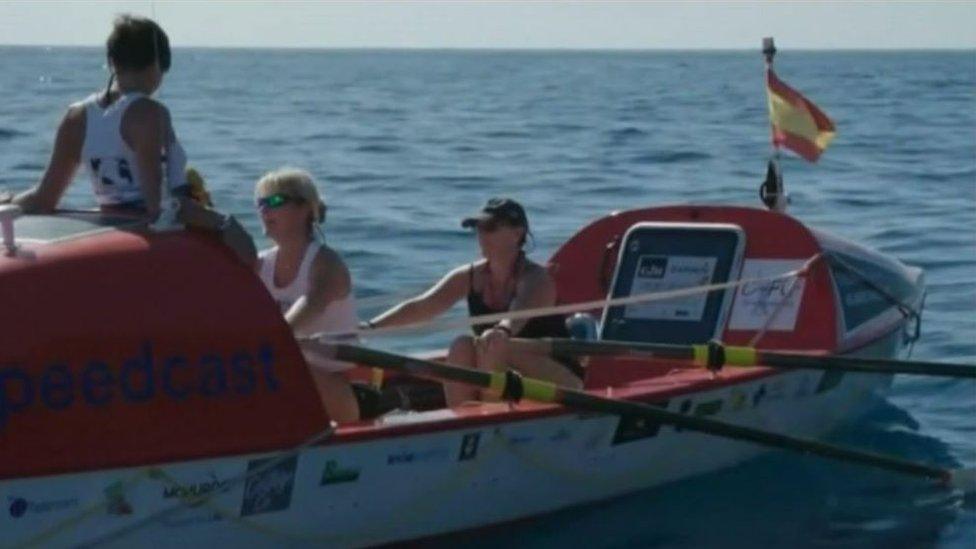'Midlife crisis' of Atlantic rowers who broke three records
- Published
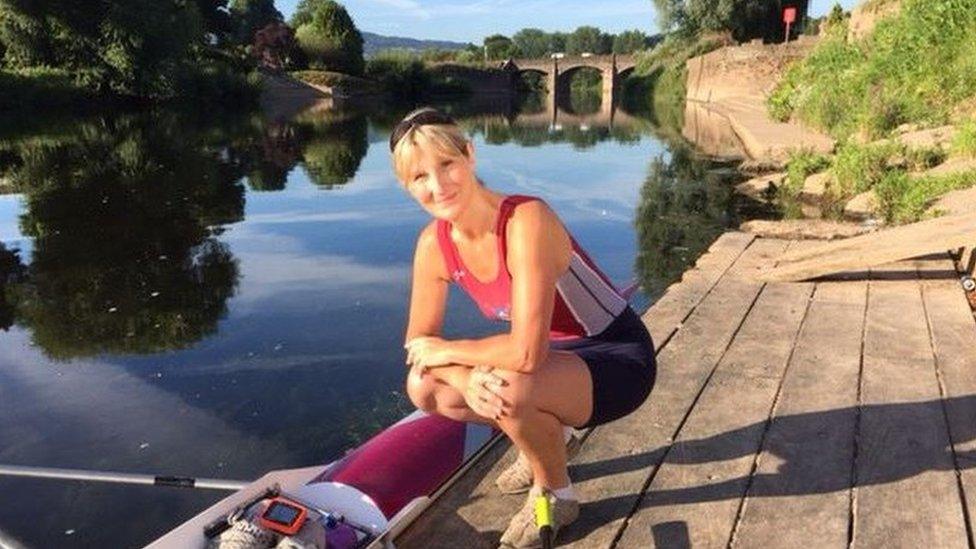
Elaine training on the River Wye before the Atlantic race
The Talisker Whisky Atlantic Challenge is considered one of the world's toughest rows.
Participants cross 3,000 miles (4,828 km) of Atlantic Ocean from La Gomera in the Canary Islands to Antigua in the Caribbean.
Here, Elaine Theaker, 54, from Abergavenny, Monmouthshire, reveals what it was like racing in terrible conditions and breaking three world records with her team Atlantic Ladies.
It was the penultimate day of our row - 59 gruelling days in, with land nearly in sight - and that's when I saw it.
The most enormous wave - 12m (40ft) perhaps, the height of a three-storey building, lurking on the horizon.
Weather conditions were terrible, the worst for 20 years with an electrical storm creating squalls of winds up to 40 knots.
As I heaved on the oars, I prayed the wave wouldn't crest by us and tip us in.
But, after so long at sea, I could gauge when a wave would break and, as it drew closer, I knew we were in trouble.
We began rising up its side, then felt the water break on top of us, pouring over the gunnels.
An oar caught the surf and flipped the boat over, catapulting myself and fellow crewmate, Sharon Magrath, 55, out.
Although tethered to the boat, we still flew, and were thrown under the boat with no chance of a gulp of air.
The water tossed us about as if in a washing machine.
But as we scrabbled back injured on board, we faced another challenge.
Di Carrington, 62 - our third crewmate - had been in the boat's cabin when the wave hit, but as we banged furiously on the door, there was no answer.
Had she knocked herself out?
In fact, she'd been making an emergency call to race control on our satellite phone, but as she opened the door, another monster wave struck.
Surf gushed in, half flooding the cabin and tipping the boat so Sharon and I were flung out into the waters once more.
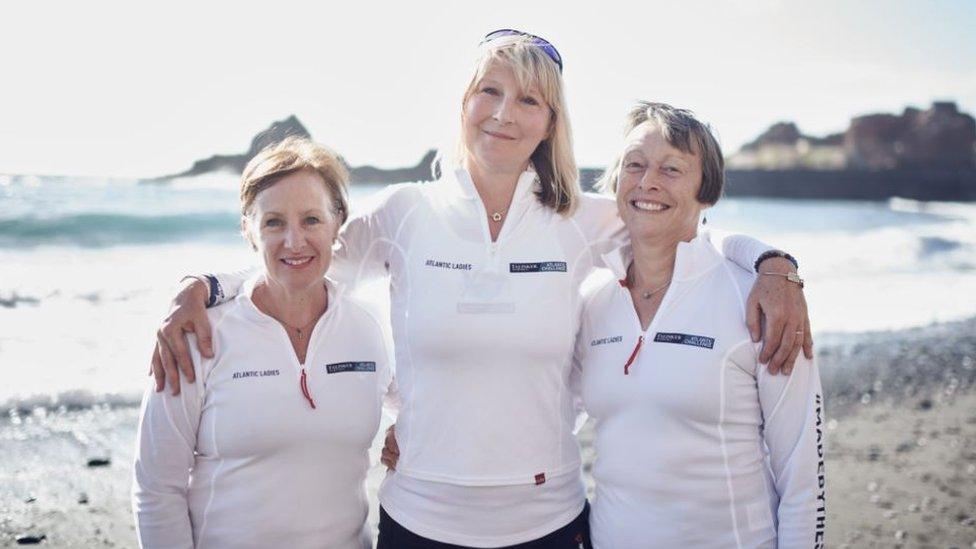
The team at the start of the challenge: From left, Sharon Magrath, Elaine Theaker and Di Carrington
Again, back on board, we began to assess the danger of our situation.
With more massive waves circling like sharks, we were injured - Sharon with a bruised back and sternum, and myself with a massive haematoma or swelling on my leg and possible fractured pelvis.
But there was grim news from race control.
Although we were just 37 miles (59 km) from shore, search and rescue couldn't reach us - the weather was too wild.
Worse, there came a warning; we would need to row through the night; letting the boat drift would risk us missing Antigua completely.
By now, it was approaching dusk. The sky would soon be black and the sea was whipping into a frenzy.
We knew that rowing in the dark would mean we wouldn't see the waves coming, and we could be tipped blind into the waters, but there was no choice.
I swallowed some painkillers and, with Sharon too injured to row, Di steered and I grabbed the oars.
Terrified, we rowed the next eight hours straight, living on adrenalin, sharing the rowing and steering between us.
I can't describe the relief when, two miles (3km) out, we saw the bright lights of the search and rescue boat.
The waves were still 4.5m (15ft) high but their boat guided us in so we wouldn't hit rocks, reaching land at 02:30.
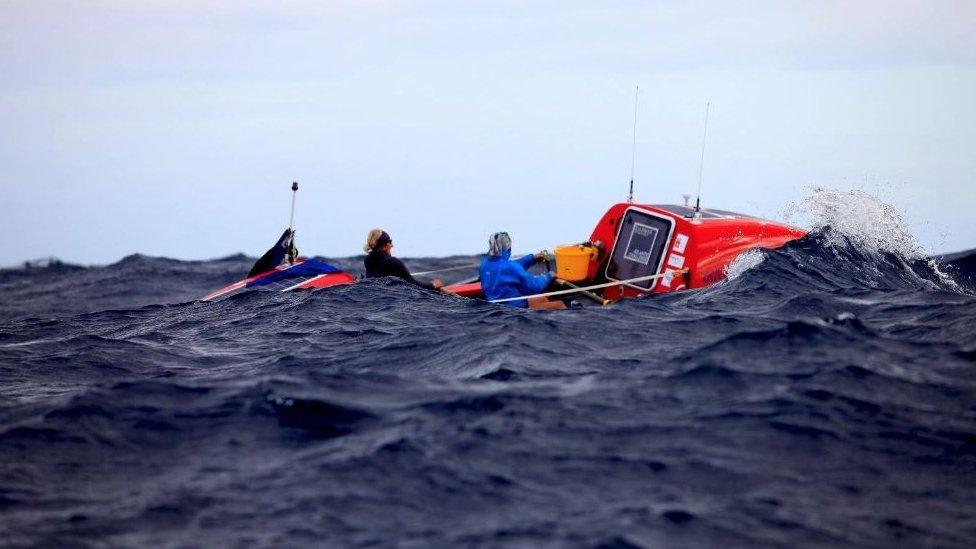
Atlantic Ladies heading out to sea
I was met by my husband Steve and 15-year-old son Che, but after 60 days at sea, I felt like I was dreaming.
Unable to walk, I was taken to hospital for X-rays, only then realising that in the last 48 hours, I'd drunk less than 500ml of water and only eaten two Mars bars.
We had survived, but there was no doubt, it had been high drama at sea.
Of course, I couldn't blame anyone but myself. Rowing the Atlantic had been my idea, beginning as a seed in my mind just two years earlier.
I'd only begun rowing in 2011, inspired by those I saw on the River Wye as I drove my son to his school in Monmouth.
After signing up for a rowing course, I was soon competing in races and rowing marathons.
Then I heard of four mums who had crossed the Atlantic and decided I could do it too.
Sticking their oar in
Perhaps it was a midlife crisis thing or a need to escape for a while. I don't know.
But as none of my local rowing friends were keen, I attended a seminar put on by the Talisker Whisky Atlantic Challenge race organisers.
It was there I met Di from Shropshire.
We gelled, decided to give it a go, then soon after met Sharon to complete our trio.
Autumn 2016 saw the start of the preparations, putting down a deposit on a boat and looking for sponsors.
At this point, I don't think anyone thought we were serious, but that changed when our boat arrived the following spring.
Christened Poppy, it was an engineering triumph - a fibreglass and plywood construction, 7m (23 ft) by 1.8m (6ft) with two cabins, and self-righting properties if it capsized.
Its first outing was on Llandegfedd Reservoir, near Cwmbran.
Then we rowed around Cardiff Bay and in the Solent near the Isle of Wight, rowing both at night and in tidal waters to get a taste of what was to come.
Our first sea crossing was on the second leg of the NOMAN Race from Ibiza to Barcelona, and then, on 14 December 2017, we finally set off on our journey.
There were 28 teams in total, with three all-female crews and us the oldest by far.
As we lined up in the harbour, there was a great buzz in the air as people waved and cheered.
A blast of a horn, and we were off, feeling like sporting heroes before we'd even begun.
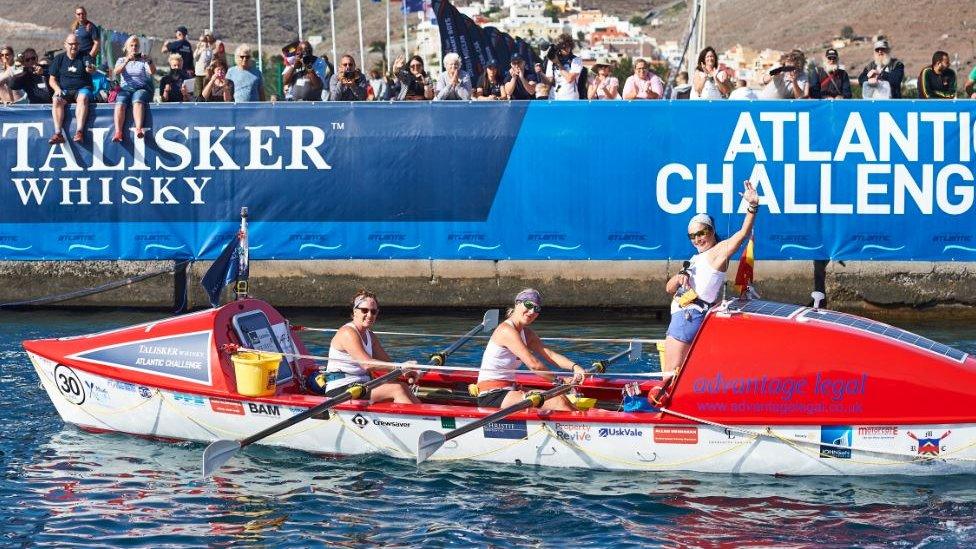
Atlantic Ladies on the start line
But in just a few short hours, we had lost sight of all other boats and found ourselves alone.
Over the next few weeks, the reality of what we had undertaken hit home.
Early on, we were hit with seasickness, left feeling so queasy we couldn't eat, leaving us with no energy to row.
Thankfully, Sharon, a nurse, took control of our health and forced us to eat, slowly allowing our energy levels to return.
But there were more challenges ahead.
Most days we would average 50 nautical miles, but windless days left us struggling to do 20.
Sometimes we'd be terribly homesick.
'Biggest challenge'
Other times we'd be exhausted and physically low, with salt sores on our bums and aching joints, making each rowing stroke painful.
We had to deal with flappy, slimy flying fish that would land on the boat at night, and cleaning barnacles off the hull with someone on shark watch.
But finding mental strength was the biggest challenge - coping with the enormity of the ocean and rowing solo at night, hearing and feeling the waves coming at you but not being able to see them.
To suppress my fear, I would often listen to music to drown out the sound of the waves, zoning out by imagining I was back home on my rowing machine.
It was so effective, sometimes I would jump in surprise when I felt the water slosh over my feet.
But there were also great moments of peace and beauty, like when we could take a dip in a warm, calm ocean - bliss.
I was on the oars on the night of the "'supermoon" in late January.
At 03:00, I heard a strange noise and some dorsal fins appeared from nowhere.
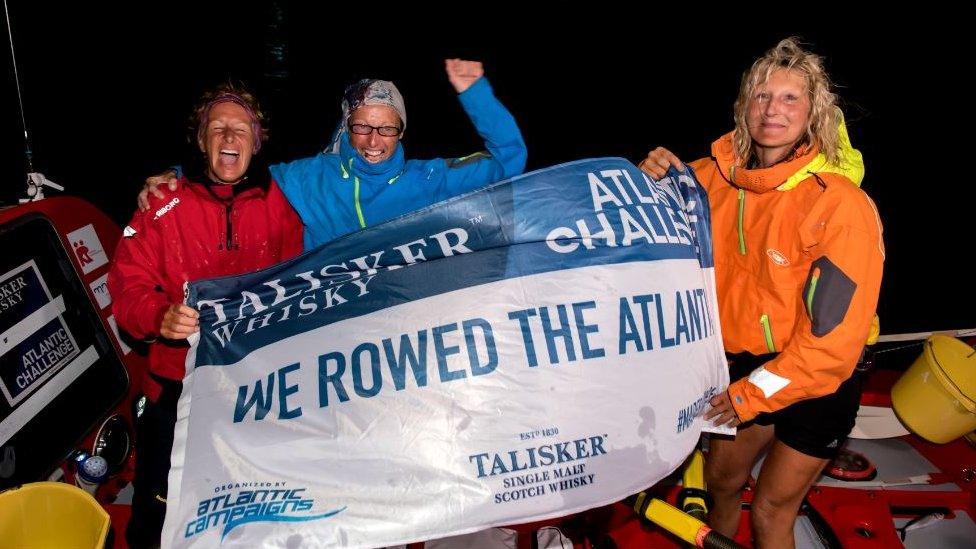
At the race end: From left, Sharon Magrath, Di Carrington and Elaine Theaker
The sight and sound was initially terrifying, but I soon realised it was a pod of dolphins that then swam by the boat for 20 minutes.
We encountered whales too, and two stripy pilot fish, which we nicknamed Boris and Doris, who stayed with us for weeks, feeding on our food scraps.
It's strange looking back.
Sometimes I think anyone could have done what we did - we just sat in a boat and rowed.
But then I think of the mental strength we needed to cope with the ocean and I know that's not true.
We broke records too.
The race may have taken us 60 days, 18 hours and 34 minutes - longer than most other competitors this year.
But we became the oldest crew of women to row the Atlantic ocean, and the only trio. Di also became the oldest woman to row any ocean at the age of 62.
Plenty of teams didn't make it at all.
And I take great pride in that.
A play called Atlantic Ladies, which follows the trio's epic journey, will be staged at Abergavenny's Borough Theatre and Shrewsbury's Wightman Theatre in September.
- Published13 February 2018
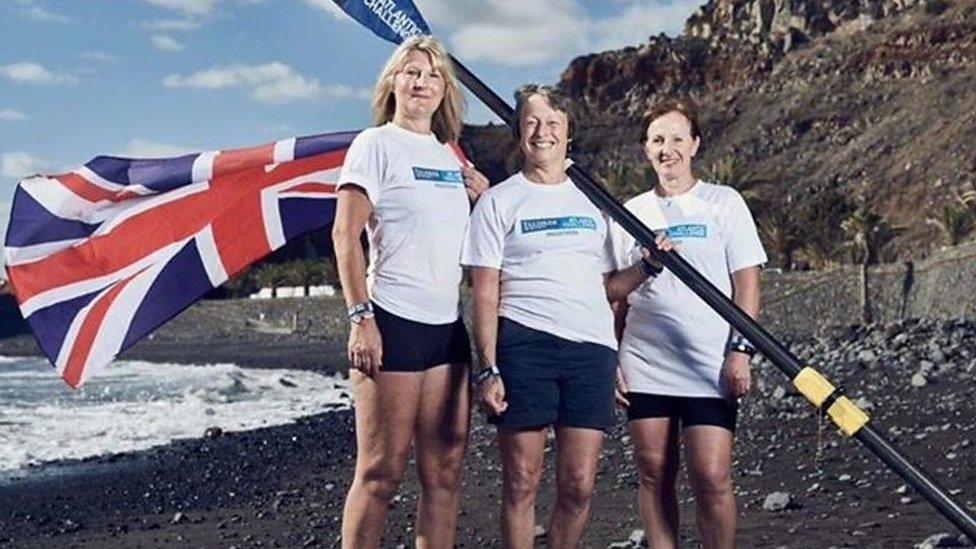
- Published25 January 2016
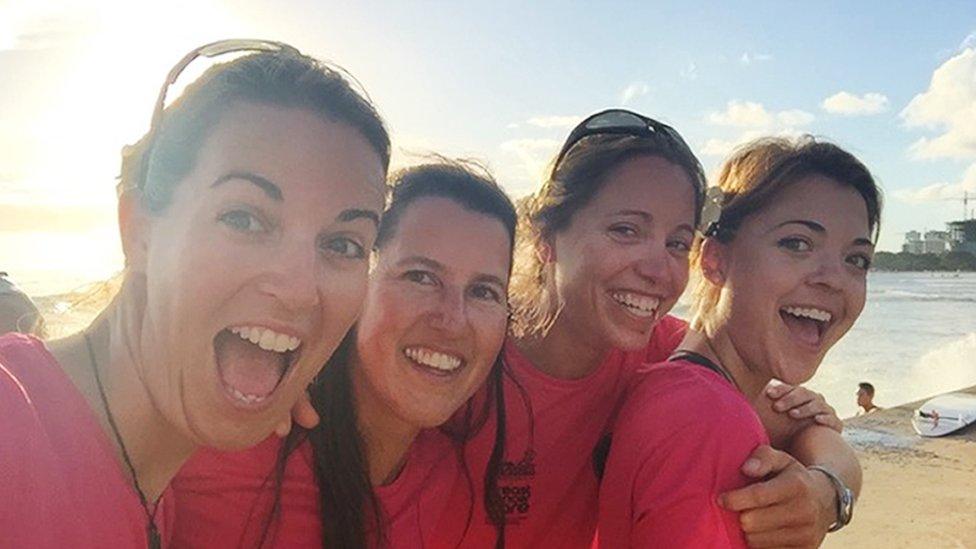
- Published27 December 2015
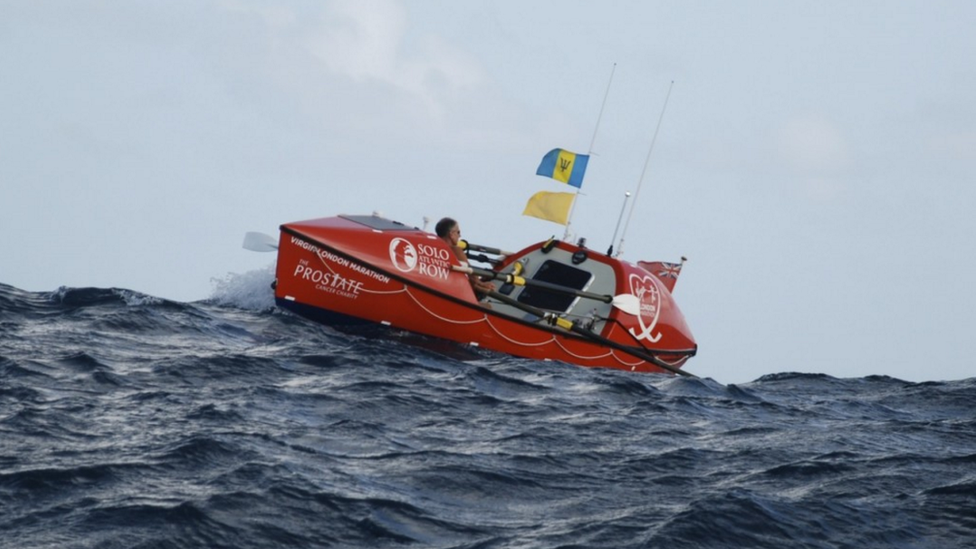
- Published13 February 2018
